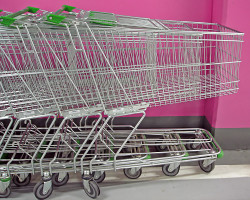How can I reduce my dependence on big supermarkets?
 We’ve had an email from Alice with so many ‘Reduce This’ questions that I’m going to have to run them two a week to get through them ;)
We’ve had an email from Alice with so many ‘Reduce This’ questions that I’m going to have to run them two a week to get through them ;)
First up:
I want to reduce my use of Tesco, which I use because I don’t have transport and it’s the only one-stop place I can walk to with my rucksack for my weekly shop, but I’d be interested to hear any ideas people have for reducing personal dependence on the “Big Four” evil supermarkets.
In an ideal world, we’d all manage our own allotments and shop at local, independent shops, who source good quality items from local farms & producers. In the real world, this isn’t always possible – there are a limited number of allotments available and people have time constraints that don’t exist in the fantasy world – it’s hard to shop at small shops that are only open 9-5 when you have a 9-5 job.
Because of the big supermarkets, there are also obviously a lot less small shops around – right now, we live close to a local high street which is almost completely filled with chain stores and the house we’re (hopefully) moving to is very close to a big supermarket so there are no local shops at all.
So what have you done to reduce your use of the big supermarkets? How have you fitted it around your busy life? What would you recommend? What would you not recommend? And what about non-food items?
























We made a similar decision about two years ago, and the same constraints of two large local supermarkets and no local grocery shops or delis. We now have an organic veg box delivered every fortnight, milk delivered by a proper milkman and wine and staples in bulk mail order from a fair trade organisation (when we remember!)
This doesn’t help our high street though, so we made the decision to shop at the local butchers and weekly street market for what we can on a Saturday. We still have to use ASDA for groceries, as there are no small shops selling them in our town.
Our ‘Transition Towns’ group is hoping to organise 100 mile diet where you eat food produced locally for a month, could be quite a challenge!
This is a tough one. These big supermarkets are reflections of the life we lead in this modern world. The way I fight back is by making my own laundry soap (which cheats the detergent makers out of a sale and is much safer for the environment), growing as much food as I can in my garden (all for the price of seed, imagine that!), using natural cleaning products such as baking soda and vinegar. I realize that some of these things take time, and we do live in a busy world most especially young people with children of their own. I’d say: Do what you can, and don’t fret about the rest.
I had one non-food idea recently – using excess rhubarb from my allotment as a descaler for the kettle and the loo. http://alice-in-blogland.blogspot.com/2009/07/free-acid.html
No problem so far, it works really well!
I hate supermarkets — I get totally overwhelmed by the choice, the crowds and the horrid beeping noises, so I avoid them when I can. I also hate the buy one, get one free offers. I’m all ‘get lost, I don’t want two, I want one. Preferably for half price.’
We get a weekly veggie box — not from a local supplier though, mainly because I’ve tried them and had problems with the quality and variety. The company that supplies us also does a full range of other bits, too — but compared to the supermarket they are a little expensive.
We use a bakers (when we get there in time – bread runs out at 2pm) and the local butchers. I also try to use the local greengrocers for anything that doesn’t appear in the box.
We’re lucky enough to have a milkman — but it’s quite a bit more expensive than the supermarket, and he’s not organic. Although it’s lovely to always have milk available or about to arrive.
We have a fortnightly farmers’ market, which I find very expensive, but the meat is excellent — I’m moving towards smaller servings of meat in fewer meals, which means I can afford to spend more on what I do buy.
We are also lucky enough to have an independent supermarket called Spice Store — it’s a treasure house of exotic ingredients, but also sells things like tinned tomatoes and noodles very cheaply. The only problem is that they’re all imported from far-flung places, which is not so good if you’re counting food miles.
My other tip would be to throw away your loyalty cards — that way, you’re not tempted.
Make sure you use your freezer if you’ve got one.
When you can visit local stores, farm shops etc, buy extra and freeze it so you can live off that rather than having to go to supermarkets regularly to buy fresh things. For example, we’ve got a drawer in the freezer full of herbs and spices – chopped up ready for action and in resealable tubs – to save having to keep fresh in all the time.
I get my eco-friendly soap and detergents from a direct sales/mail order company that charges very reasonable rates for its products and doesn’t use ‘uplines’ or middlemen. I get biodegradable/organic shampoo, personal care products and food (sauces, pasta, cereal) from an organic products retailer in my neighbourhood on Saturdays and find ways to either use up the bread before its expiry date or freeze the bread and take only what I need for food preparation. I get my pet food from the local vet because he does good work (including rescuing, vaccinating and rehoming stray animals). I can pick up all the groceries and provisions I need from these shops once a month so I have never had to make an extra car/bike trip just to shop for necessities. In addition, if it is a shop you patronise frequently, you can just call up and tell them what you need and have them hold on to it for you or let you pick it up from their shops after usual business hours, or from their homes (the vet’s wife lets me do that). I would try to support local businesses in my community, e.g. stay-at-home mums who bake breads and biscuits.
Three ways to reduce your reliance:
1. box scheme – http://www.boxbushfarm.co.uk is my local (3 villages away), but there are similar good independents out there. Try to avoid the big chain schemes if you can, but even those seem better than the supermarkets. Also, if you’re ordering to a price, a good box scheme will vary by season to give you the best value.
2. food co-ops – I’ve not done this (yet?), but there’s some support as part of http://www.makinglocalfoodwork.co.uk/ and http://www.sustainweb.org/foodcoops/
3. specialist suppliers for tinned/packet goods – goodnessdirect is one, but I’m sure there are others.
We’ve got a local online ecological store for vegetables and other stuff. They try to buy all groceries from their own farms or in the neighborhood and they deliver once a week at home.
I grow vegetables where-ever I can, even on our (flat) roof.
we’ve got two chickens in the garden.
After this question was posted, I went around surveying my friends and their shopping/consumption patterns. Those least likely to depend on hypermarkets are those who cook at home and prepare and consume a lot of fresh food e.g. vegetables, fruit, dairy and fish. Those most likely to shop at hypermarkets frequently are those who have grown to be dependent on heavily packaged processed food, e.g. frozen dinners, instant noodles, junk food. If we could wean people off the idea that they “don’t have time to cook” and therefore need processed or instant food (how much time does it take to make a salad and sandwiches anyway?), there would be greater acceptance of alternatives to supermarkets and hypermarkets.